
Tangerine Dream is a German electronic music band founded in 1967 by Edgar Froese. The group has seen many personnel changes over the years, with Froese the only constant member until his death in January 2015. The best-known lineup of the group was its mid-1970s trio of Froese, Christopher Franke, and Peter Baumann. In 1979, Johannes Schmoelling replaced Baumann until his own departure in 1985. This lineup was notable for composing many movie soundtracks. Since Froese's death in 2015, the group has been under the leadership of Thorsten Quaeschning. Quaeschning is Froese's chosen successor and is currently the longest-serving band member, having joined in 2005. Quaeschning is currently joined by violinist Hoshiko Yamane who joined in 2011 and Paul Frick who joined in 2020. Prior to this Quaeschning and Yamane performed with Ulrich Schnauss from 2014 to 2020. Schnauss only played two shows with Froese in November 2014 before Froese's passing.

My Generation is the debut studio album by English rock band the Who, released on 3 December 1965 by Brunswick Records in the United Kingdom, and Festival Records in Australia. In the United States, it was released on 25 April 1966 by Decca Records as The Who Sings My Generation, with a different cover and a slightly altered track listing. Besides the members of the Who, being Roger Daltrey (vocals), Pete Townshend (guitar), John Entwistle (bass) and Keith Moon (drums), the album features contributions by session musician Nicky Hopkins (piano).
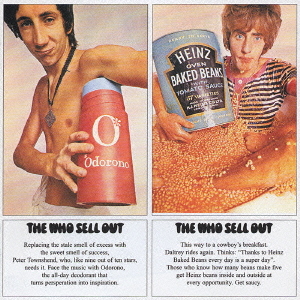
The Who Sell Out is the third studio album by the English rock band the Who. It was released on 15 December 1967 by Track Records in the UK and Decca Records in the US. A concept album, The Who Sell Out is structured as a collection of unrelated songs interspersed with fake commercials and public service announcements, including the second track "Heinz Baked Beans". The album purports to be a broadcast by pirate radio station Radio London. The reference to "selling out" was an intended irony, as the Who had been making real commercials during that period of their career, some of which are included as bonus tracks on the remastered CD.
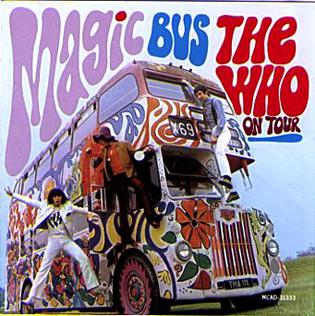
Magic Bus: The Who on Tour is a compilation album by English rock band the Who. It was released as the band's fourth album in the United States by Decca in September 1968 to capitalize on the success of their single of the same name. It is a compilation album of previously released material, and was not issued in the UK, although the album was also released at approximately the same time in Canada. It peaked at #39 on the Billboard 200.

The Mindbenders were an English beat group from Manchester. Originally the backing group for Wayne Fontana, they were one of several acts that were successful in the mid-1960s British Invasion of the US charts, achieving major chart hits with "The Game of Love" in 1965 and "A Groovy Kind of Love" in 1966.
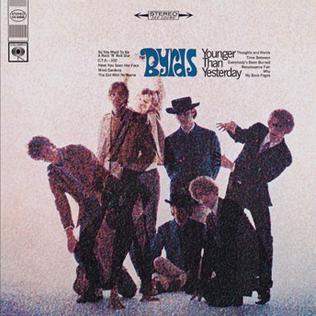
Younger Than Yesterday is the fourth studio album by the American rock band the Byrds, released on February 6, 1967, by Columbia Records. It saw the band continuing to integrate elements of psychedelia and jazz into their music, a process they had begun on their previous album, Fifth Dimension. In addition, the album captured the band and record producer Gary Usher experimenting with new musical textures, including brass instruments, reverse tape effects and an electronic oscillator.
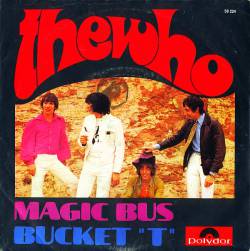
"Magic Bus" is a song recorded by British rock band the Who. It was written by their guitarist Pete Townshend during the time that their debut album My Generation was being recorded in 1965. However, it was not recorded until 1968, when it was released as a single on 27 July 1968 in the United States and Canada, followed by its release in the United Kingdom on 11 October 1968. It has become one of the band's most popular songs and has been a concert staple, although when released, the record only reached number 26 in the UK and number 25 in the United States. The song was included on their 1968 album Magic Bus: The Who on Tour.

"Pictures of Lily" is a single by the British rock band the Who, written by guitarist and primary songwriter Pete Townshend. In 1971, "Pictures of Lily" was included in the Who album Meaty Beaty Big and Bouncy, a compilation of previously released singles.
"Cotton Fields (The Cotton Song)" (also known as In Them Old Cotton Fields Back Home) is a song written by American blues musician Huddie Ledbetter, better known as Lead Belly, who made the first recording of the song in 1940.
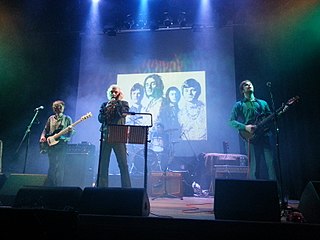
Kaleidoscope are an English psychedelic rock band from London that originally were active between 1967 and 1970. The band's songs combined the elements of psychedelia with whimsical lyrics. The band were also known at various times as The Sidekicks, The Key, I Luv Wight and Fairfield Parlour.

Legend is the twenty-eighth major release and the eighth soundtrack album by the German band Tangerine Dream. It was released in 1986 for the North American theatrical version of the film Legend. It was released in the USA and Canada only. The film was written by William Hjortsberg, starred Tom Cruise, Mia Sara and Tim Curry, was produced by Arnon Milchan, directed by Ridley Scott and released domestically by Universal Studios. The album was released on compact disc on 15 August 1995 through Varese Sarabande.
Peter James Daltrey is an English musician. He has been the lead singer and chief songwriter for the bands Kaleidoscope and Fairfield Parlour. He is also a solo artist.

"Zoot Suit" b/w "I'm the Face" was the first single of the British rock band the Who, who recorded it under the name the High Numbers in an attempt to appeal to a mod audience. "Zoot Suit" was written by Peter Meaden, the band's first manager. The song is a direct copy of "Misery" by the American R&B group the Dynamics, while the B-side, "I'm the Face", is a copy of Slim Harpo's "I Got Love If You Want It." The single was meant for a mod audience, but failed to chart. The band changed their name back to The Who, found new management, and released their own composition "I Can't Explain", which became a top ten hit in the United Kingdom.
"(I'm Not Your) Steppin' Stone" is a rock song written by Tommy Boyce and Bobby Hart. It was first recorded by the English band the Liverpool Five in early 1966 but remained unreleased before summer of that same year. In the meantime, the American band Paul Revere & the Raiders recorded the song which appeared on their album Midnight Ride, released in May 1966.

"Mary Anne with the Shaky Hand" is a song by the English rock band the Who. It was written by Pete Townshend and released on their 1967 album The Who Sell Out. The best known version of the song has an arrangement using acoustic guitar and Latin percussion instruments.

"Dogs" is a UK single written by Pete Townshend and released by the Who in June 1968. It reached number 25 on the UK singles chart, lower than any single the band had released in several years. The B-side of the UK single was "Call Me Lightning". Both songs were originally released mixed in mono only, as they were not intended for album release.

White Faced Lady is an album by UK band Kaleidoscope. It is a concept album that tells the story of a pale-skinned girl named Angel, from her troubled youth to her sudden rise to fame as a movie star to her tragic decline and untimely death. Reportedly, it was inspired by the life of Marilyn Monroe, and indeed the final track name-checks Marilyn and Arthur Miller. As a rock opera, it follows the example of The Pretty Things' S. F. Sorrow rather than The Who's Tommy, with the liner notes telling the complete story and the songs expounding on key events. Many of the songs are tied together by brief musical segues.

Clambake is the sixteenth soundtrack album by American singer and musician Elvis Presley, released by RCA Victor in mono and stereo, LPM/LSP 3893, in October 1967. It is the soundtrack to the 1967 film of the same name starring Presley. He entered RCA Studio B in Nashville, Tennessee on February 21, 1967, for recording sessions for his twenty-fifth film. Supplemental material sessions took place on September 10 and 11, 1967. It peaked at number 40 on the Billboard 200.

Faintly Blowing is Kaleidoscope's second studio album released by Fontana Records in April 1969.

"Get Me to the World on Time" is a song written by Annette Tucker and Jill Jones for the American garage rock band, The Electric Prunes. The song was released in March 1967 following the success of the band's previous single, "I Had Too Much to Dream ". Although the follow-up did not have the same success, "Get Me to the World on Time" still charted at number 27 on the Billboard Hot 100. The single also fared slightly better in the UK, where it reached number 42.

















